As the outbreak of COVID-19 continues, countries across the globe have felt the economic impacts of the pandemic. Supply chains and distribution networks are affected as consumer demand climbs for essential products. Countries reacting to the outbreak are enforcing social distancing practices that increasingly push consumers toward virtual marketplaces.
Goods and services have become increasingly accessible online over the last decade, making shopping easier from the comfort of one’s home. This evolution seems to offer strong potential to meet the appetite of consumers for accessible, expedited goods. With growing consumer demand for these advancements, there is an increased need for storage space and logistics networks to facilitate the growth of various industries such as e-commerce, grocery delivery and cannabis.
As markets reconfigure to fill the economic holes punctured by COVID-19, investors can gain exposure to industrial real estate sectors that support and facilitate businesses with much-needed distribution centers, warehouse facilities and logistics networks. Exchange traded funds can offer investors an opportunity to incorporate alternative real estate assets into their portfolio with industrial REITs.
The E-Commerce Boom
E-commerce is a growing aspect of the retail sales market. Industry projections estimate e-commerce sales to nearly double over the next 10 years. Despite accounting for only a small fraction of the retail industry, e-commerce is responsible for nearly half of the incremental growth in U.S. retail sales over the past three years. There is ample room for e-commerce to grow, but it requires a buildout of warehouse space. This presents a unique opportunity for investors.
Real estate developers are eager to build out fully optimized warehouses that can keep up with demand. As Amazon and other retailers introduce one-day shipping, warehouse space becomes an increasingly important component for businesses. E-commerce requires three times as much logistics space as traditional brick-and-mortar, morphing into an “arms race for space” to accommodate growth. Existing industrial real estate is near capacity, hitting vacancy records as low as 4.3%. Developers are moving quickly to build new facilities and improve existing ones as e-commerce demand potential outpaces supply.
Industrial REIT investments offer a way for investors to play into this opportunity within the e-commerce sector without direct exposure to retail equities like Amazon, Walmart and other household names. Rather, an investor can take advantage of this sector’s growth potential by targeting the build-out of industrial real estate.
Groceries-on-the-Go
COVID-19 has sparked a mad dash to grocery stores as consumers strip shelves bare of nonperishables and household supplies. As a result, consumers are increasingly moving their purchasing online. Digital grocery store sales featuring home delivery have steadily increased, with revenues in the U.S. estimated to reach $59.5 billion by 2023, up from $23.9 billion in 2018. Today’s digitally native consumer has come to expect convenient online services to extend to grocery shopping. In response, savvy warehouse developers are eager to give retailers the space they need to store perishable items.
These products inherently come with a shelf life, so food distribution companies also must be equipped with cold storage facilities. This reality offers another unique opportunity for investors to diversify their real estate investment portfolios. The warehousing requirements for cold storage are unlike traditional real estate assets due to the strict temperature-controlled environments needed to meet safety and quality guidelines. Although this consideration tends to be costly, suppliers are willing to pay premiums to accommodate consumers who are adopting a new preference for grocery delivery.
Similar to e-commerce warehouses, location also plays a crucial role in the development of these fulfillment centers.. Heavily populated cities and saturated real estate markets prompt developers to update existing structures to meet the specific requirements of cold storage. The result is a unique new asset class to consider for investor portfolios, as industrial real estate moves to accommodate changing consumer needs.
Weeding Out Cannabis Financing
A retail sector that requires unique infrastructure development is the cannabis industry, a business deemed essential amid the pandemic. Cannabis operations require industrial space for cultivation and commercial space for sales to support the $13 billion global legal cannabis market. These facilities and warehouse operations are geared less toward traditional storage facilities, however. Instead, operations prioritize creating ideal growing conditions.
With demand for production real estate rising, access to financing can be difficult due to discrepancies between state and federal laws. To overcome the funding gap caused by competing jurisdictions, developers are turning toward private investments to facilitate growth. Moving forward, industrial REITs will integrally support the growth of this industry by providing the funding necessary to expand warehouse operations beyond current small-scale limitations. For investors who want to gain exposure to the cannabis industry, but don’t have the stomach for the volatility of pure-play equities, the industrial option might be an attractive entry point.
Risks to Consider
For investors interested in capitalizing on growing demand within these sectors, it’s important to also consider the risks associated with niche markets. Companies in the industrial real estate world are susceptible to supply and demand factors on a more concentrated level. For example, e-commerce is partially dependent on the strength of the consumer and cannabis facilities are dependent on federal and state law. On a macro-level, industrial real estate may be more susceptible to interest rate changes, tax regulations and government policies. These are all risks worth evaluating in today’s unique circumstances, but the growth in the subsectors of the industrial real estate market remains tangible.
Looking Forward
COVID-19 is providing a panicked test of the world’s economies and logistics networks. A rapidly evolving generation of technology will soon fully integrate into everyday life, but a vast expansion of industrial real estate must occur first. The industrial REIT sector has grown quickly to keep up with the swelling demand for e-commerce, distribution centers and alternative warehouse space. Investors looking to tap into the future of these industries should consider investing through ETFs that offer exposure to the broad spectrum of expanding technologies.
Sean O'Hara is President of Pacer ETFs.





